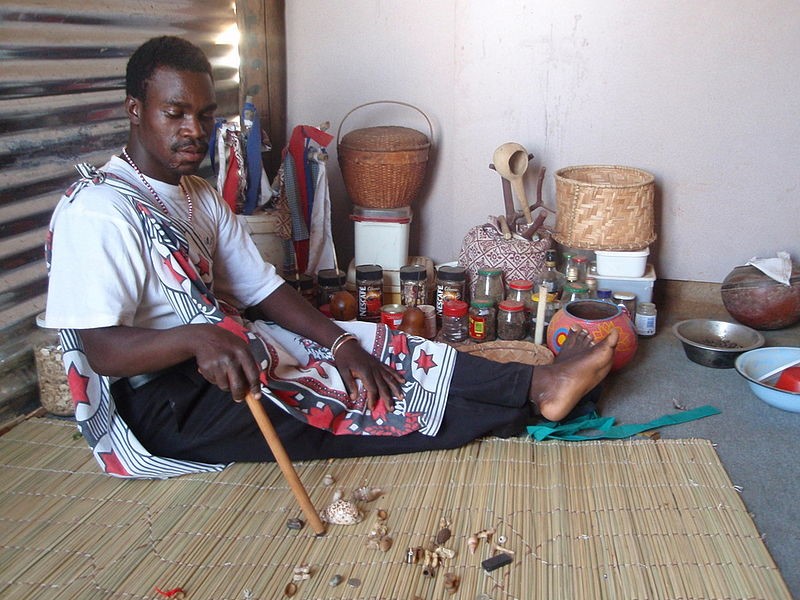The African Shaman: Some Qualifications
A response to Episode 334 ‘Exploring African Shamanism and White Sangomas in South Africa’ with Ullrich Relebogilwe Kleinhempel by James Cox
In this interview, Ullrich Relebogilwe Kleinhempel outlines the place of indigenous healers and spiritual mediators in Bantu societies by focusing on the South African traditional practitioner, called a sangoma. Other terms are used to designate this same functionary in different countries across central and southern Africa. For example, in Zimbabwe, where I worked for a number of years, the Shona word for what is commonly called a traditional healer, is n’anga. Kleinhempel defines a sangoma as a ‘Bantu shaman’. For Kleinhempel, this serves as an umbrella term to classify a variety of practitioners who are specialists in esoteric methods through which they diagnose the causes of misfortune, provide treatments to alleviate problems and offer prognoses aimed at ensuring long-term well-being. Some sangomas primarily are herbalists, who frequently use mystical means to determine the causes of illness, such as being led in a dream to the appropriate herb to prescribe the remedy for a particular affliction. Others act as diviners, who, in southern Africa, use specially engraved bones or sticks (hakata in Shona) to diagnose the cause of individual or group afflictions and prescribe remedies. After throwing or casting the bones, the diviner ‘reads’ or interprets them according to their configuration. Perhaps the most revered traditional practitioner is one who becomes possessed by a spirit, often an ancestor spirit, who has adopted a descendant as his or her host. The adopted host becomes the ancestor’s voice and, in rituals of possession, the ancestor communicates directly with kinsfolk about causes and solutions to communal misfortune. In many cases that I have recorded in Zimbabwe, the ancestor, during the possession ceremony, claims to have been neglected ritually and, as a result, has permitted a series of misfortunes to occur, such as the failure of crops, a cluster of illnesses and deaths in the community or even social conflict. Only after the ancestor has been remembered and honoured in rituals of respect is the ancestral protection restored bringing a halt to the misfortunes. After the possession ritual is concluded, the spirit’s medium does not remember what occurred. [i]
Kleinhempel’s choice of the term ‘shaman’ to describe the traditional African healing specialist is problematic for two reasons. First, shamanism, as a collective and universal category, requires careful examination. It needs to be situated culturally as being derived from Arctic peoples, where it refers to a type of practitioner characterised by entering into trance experiences, during which the shaman ‘travels’ out of the body to lower, middle and upper worlds, or in the case of the Yup’ik shaman of Alaska, is transported to the edge of the world, goes under the ice into the sea or flies to the moon.[1] In this context, the term ‘Bantu shaman’ can be misleading because it implies that it forms part of a worldwide, unified phenomenon. That this is Kleinhempel’s meaning is confirmed by his endorsement of Jungian psychotherapy in which the typological classification ‘shaman’ is interpreted as fitting into the collective unconscious. In most indigenous societies, specialists exist who apply spiritual remedies in response to individual and group misfortune, but they do not constitute a coordinated, universal movement. It is far better to consider the specialists called ‘shamans’ as sharing characteristics in common, while acknowledging that any similarities must be qualified by the cultural and social contexts in which they occur. [2]
A second, related, problem with using the term ‘Bantu shaman’ without clarification results from the distinction between shamanic trance and spirit possession. For example, traditional shamans, who operated until the early part of the twentieth century in Alaska,[3] or Greenlandic shamans of the eighteenth and nineteenth century, as recorded in the historical study by Merete Jakobsen,[4] harnessed a host of helping spirits that they employed when they went on their shamanic journeys. These spirits had been mastered over a long period of struggle that caused the shaman deep suffering. After the spirits were fully in the shaman’s control, they assisted the shaman in overcoming powerful and dangerous spirits that threatened the welfare of the community. The shaman thus was the ‘master of spirits’, who fully remembered what happened during trance states. By contrast, in southern Africa, where spirit possession is the principal form of communication between the spirit world and the living community, the medium does not control, but is controlled by, the spirit. The calling to become a medium is initiated by the spirit and the success of the ritual during which the possession occurs depends on the spirit choosing to become manifest through the medium. That the medium does not remember what occurred during the possession experience further confirms that, unlike the Arctic shaman, a spirit medium is not in control of the possessing spirit, but is subject to the authority of the ancestor. The African medium can only be said to be in control of the spirit if this is understood in community terms. If the community follows the proper ritual protocols and prepares all the elements necessary for the ritual to succeed (such as brewing beer and informing the ancestors of their intentions), the spirit will appear through the chosen medium and converse with the community. The term shaman can only be applied in the strict sense if it is understood as ‘community shamanism’, where the control of events is dictated by community behaviour.[5] This distinction is important if we are to avoid using unqualified generalisations to categorise localised cultural practices.
Another issue raised by Kleinhempel in his interview that I wish to address is methodological. He quite rightly draws attention to the way African traditional worldviews were denigrated and at times demonised under the influences of colonialism, Christian missions, and Western education. He sees this tendency persisting today in the form of scientific reductionism, which rejects any spiritual or mystical explanation for causes of misfortune. In Africa, such explanations are found everywhere, although these are not generally understood by African communities as contradicting Western scientific rationality. Rather, they complement Western worldviews, adding depth to them by granting access to alternate forms of healing and sources of well-being. This point is well made by Kleinhempel, but I think he goes one step too far. His aim is not only to foster respect for African cultural practices, but he extends beyond this worthwhile goal by claiming that the African spirit world is ‘real’. What he means by ‘real’ is left somewhat unclear, but he appears to be claiming that the ubiquity of spirits that populate African cultural perspectives actually exist.[6] He cites phenomenological principles in support of this assertion and claims affinity with Victor and Edith Turner on this viewpoint. It is well known that after Victor Turner died, Edith, who was then working in Alaska, claimed that she had encountered spirits and as a result confirmed their ‘reality’. [7]
Although phenomenology has a well-developed philosophical tradition fostering intense empathy and intersubjectivity, as it has been applied in the study of religions, it refuses to make judgments on the reality or unreality of the beliefs of religious communities. This approach was voiced clearly by Ninian Smart in what he called ‘methodological agnosticism’.[8] I have argued that stage one in the phenomenological method employs the idea of epoché, the suspension or bracketing out of prior assessments, such as ideas of ranking religions according to their proximity to rational thinking or previously formed opinions based on theological assumptions. This technique allows researchers to enter into communities they are studying by bringing to their consciousness their most obvious and distorting presuppositions. By reflexively becoming aware of their predispositions and placing them in brackets (the epoché), researchers can then employ the second stage in the method, empathetic interpolation, whereby they cultivate a feeling for the subjects of their research and relate what otherwise might appear to them as strange or bizarre in terms that are culturally comprehensible. The stage of empathetic interpolation aims at achieving understanding in depth (Verstehen) without either endorsing or rejecting the truth claims of believing communities. The third phase I have outlined is most relevant at this point: maintaining epoché, that is, continuing to suspend judgments about claims to truth or falsehood, either from believers’ perspectives or from the point of view of scientific rationality. The question of ‘real’ or ‘unreal’ does not arise; it remains bracketed.[9]
If this interpretation of phenomenology is applied in the case of the belief in African spirits and mystical causality, Kleinhempel’s objections to Western rationalism, scientific reductionism, and cognitive science, although understandable, are no more relevant to the academic study of religions than are his assertions about the ‘reality’ of the African spirit world. By combining the techniques of epoché and empathetic interpolation, the researcher conveys respect for the beliefs, practices, and alternate therapies forming the African worldview without either sanctioning or refuting them. Subsequent academic interpretations of African traditional practitioners and ritual specialists in this way are formed against the backdrop gained by the researcher entering into African perceptions of a spirit world without falling prey to errors created by models derived from confessional theology.
[1] James L. Cox 2007. From Primitive to Indigenous: The Academic Study of Indigenous Religions. Aldershot: Ashgate, 110-15.
[2] James L. Cox 2020. ‘Shamanism’ in A. Possamai and A.J. Blasi (eds). The Sage Encyclopedia of the Sociology of Religion, vol. 2. Los Angeles and London: Sage Reference, 747-8.
[3] Ann Fienup Riordan 1994. Boundaries and Passages. Rule and Ritual in Yup’ik Eskimo Oral Tradition. Norman and London: University of Oklahoma Press, 288-310.
[4] Merete Demant Jakobsen 1999. Shamanism: Traditional and Contemporary Approaches to the Mastery of Spirits and Healing. New York and Oxford: Berghan Books, 39-146.
[5] James L. Cox 2008. ‘Community Mastery of the Spirits as an African Form of Shamanism’. DISKUS. The Journal of the British Association for the Study of Religions 9 (Autumn). http://jbasr.com/basr/diskus/diskus9/index.html
[6] Ullrich Relebogilwe Kleinhempel 2017. ‘Covert Syncretism: The Reception of South Africa’s Sangoma Practise and Spirituality by “Double Faith” in the Contexts of Christianity and of Esotericism’. Open Theology 3(1), 642-661. https://www.degruyter.com/view/journals/opth/3/1/article-p642.xml
[7] Edith Turner 1997. ‘The Reality of Spirits’. Shamanism 10(1). https://www.shamanism.org/articles/article02page4.html.
[8] Ninian Smart 1973. The Science of Religion and the Sociology of Knowledge. Princeton: Princeton University Press, 54.
[9] James L. Cox 2010. An Introduction to the Phenomenology of Religion. London and New York: Continuum, 49-57.
[i] James L. Cox 1998. Rational Ancestors. Scientific Rationality and African Indigenous Religions. Cardiff: Cardiff Academic Press, 199-219.



